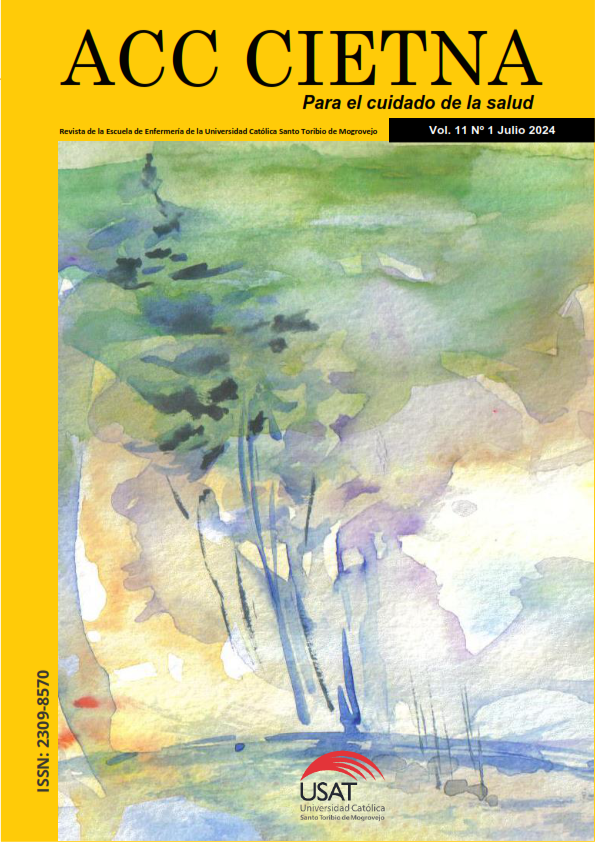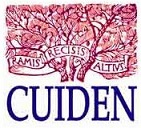Abstract
Being a nurse is embracing a vocation that transcends the profession; mediated by a deep commitment to human vulnerability. This involves not only the ability to alleviate the suffering of the sick person, but also the dedication to protecting their dignity and recognizing their intrinsic value as a human being. It is a call to be a beacon of hope in the darkest moments, where every gesture and every word can make a difference in the lives of those who trust nurses. They reason that the sick person needs them, perceiving how they rethink life and fear death or loneliness.
Abstract
Being a nurse is embracing a vocation that transcends the profession; mediated by a deep commitment to human vulnerability. This involves not only the ability to alleviate the suffering of the sick person, but also the dedication to protecting their dignity and recognizing their intrinsic value as a human being. It is a call to be a beacon of hope in the darkest moments, where every gesture and every word can make a difference in the lives of those who trust nurses. They reason that the sick person needs them, perceiving how they rethink life and fear death or loneliness.
Keywords: Nurse; Nursing Care.
Editorial
En reuniones de Enfermería, suelen surgir anécdotas interesantes donde se protagoniza algún acontecimiento inolvidable como la narrada por una distinguida colega cuando le preguntaron ¿cómo se ve como enfermera dentro de 10 años? La respuesta fue rápida y elocuente, ¡¡me veo como doctora de enfermería!!, con mis hijos realizados e investigadora reconocida, anhelos que en la actualidad se visionan en parte conseguidos, en el esfuerzo tendencial de superación permanente.
También, en el panorama sanitario global1, la enfermería se erige como la fuerza motriz que mantiene en funcionamiento los sistemas de salud. Se posesiona con responsabilidad en la coordinación de los equipos multidisciplinarios en todos los niveles de atención, desde la atención primaria hasta los centros de alta complejidad, convirtiéndose en un sostén invisible para millones de personas necesitadas de cuidado.
La historia también la reconoce al valorar, no solo el impacto crucial de enfermería en el cuidado integral de las personas, la promoción de la salud, la prevención de enfermedades, sino también por la humanidad2 desprendida al promover la interculturalidad del cuidado, al asumir roles de liderazgo en la gestión de los equipos y en el propio sistema de salud. Pero ¿cómo lo logra? Aquí una respuesta mundial y con esta, el sentir de miles de enfermeras en el mundo:
Al demostrar, el ser de Enfermería, que, por ser trascendental3, solo es posible alcanzarlo por la persona-enfermera, con auténtica sabiduría humana. La persona es coexistente, es decir, que es imposible existir en solitario o aislada de los demás. Entonces se advierte que la persona humana no es ser como fundamento, sino que tiene el ser personal otorgado. La aludida donación denota también que la persona que se conoce es apertura, libertad, por eso vinculada a quien le da el ser. Tal libertad no es propia de una facultad, sino que equivale al acto de ser personal3, que la hace capaz de dirigir el cuidado convertido en una acción esencial que no solo preserva la vida, sino que también fomenta el crecimiento personal y la transformación de las relaciones dentro de un marco de compromiso-solidaridad.
En este compromiso, Enfermería se reinventa de manera continua, ante los cambios y defensa de su rol4 en el contexto de la salud, nunca como antes ha superado sus funciones tradicionales para incorporar la innovación y el enfoque humanista con apertura hacia la ayuda y solicitud ante el interés y la necesidad del otro, develando su actuación como agente de cambio, de salida, al promover la transformación del cuidado con criterio recto y sustentado en la verdadera ética3, mostrado en la práctica del cuidado al unir normas, bienes y virtudes, con valor agregado de proteger a las enfermeras de la omisión, la rutina o el descuido; por el contrario, emergerá la humanidad compasiva a lo divino.
Ser enfermera es abrazar una vocación que trasciende la profesión; mediado por un compromiso profundo con la vulnerabilidad humana. Esto involucra no solo la capacidad de aliviar el sufrimiento de la persona enferma, sino también la dedicación a proteger su dignidad y a reconocer su valor intrínseco como ser humano. Es un llamado a ser un faro de esperanza en los momentos más oscuros, donde cada gesto y cada palabra pueden marcar la diferencia en la vida de quienes confían en las enfermeras. Ellas razonan que la persona enferma, las necesita, al percibir como se replantean la vida y temen a la muerte o soledad.
En este sentido, Enfermería no está exenta de dificultades exige preparación continua, trabajo arduo; más sencillo “hechos”, sin dictaduras, por el contrario la enfermera sabia5, reacciona, no se deja ganar porque posee un autoconcepto positivo, observa, interpreta e integra la realidad, decide y hace cuidado, desplegando competencias científicas, humanas; ciencia, arte; entrega total y amor, que resume su ser enfermera y aun en dificultades sabe dar respuestas mundiales por servir de manera trascendental.
Editorial
In Nursing meetings, interesting anecdotes often arise where some unforgettable event takes place, such as the one narrated by a distinguished colleague when she was asked: How do you see yourself as a nurse in 10 years? The response was quick and eloquent, I see myself as a nursing doctor!!, with my accomplished children and a recognized researcher, desires that today are seen to be partially achieved, in the trend of permanent improvement.
Also, in the global health panorama1, nursing stands as the driving force that keeps health systems functioning. It is responsible for coordinating multidisciplinary teams at all levels of care, from primary care to highly complex centers, becoming an invisible support for millions of people in need of care.
History also recognizes it by valuing, not only the crucial impact of nursing in the comprehensive care of people, the promotion of health, the prevention of diseases, but also for the humanity2 given off by promoting the interculturality of care, by assuming roles. Of leadership in the management of teams and in the health system itself. But how does he achieve it? Here is a global response and with this, the feelings of thousands of nurses around the world:
By demonstrating, the being of Nursing, that, because it is transcendental3, it is only possible to achieve it by the person-nurse, with authentic human wisdom. The person is coexisting, that is, it is impossible to exist alone or isolated from others. Then we notice that the human person is not being as a foundation, but rather has personal being granted. The aforementioned donation also denotes that the person one knows is openness, freedom, therefore linked to the one who gives him being. Such freedom is not typical of a faculty, but is equivalent to the act of being personal3, which makes it capable of directing care that has become an essential action that not only preserves life, but also encourages personal growth and the transformation of relationships within a framework of commitment-solidarity.
In this commitment, Nursing continually reinvents itself, in the face of changes and defense of its role4 in the context of health, never as before has it surpassed its traditional functions to incorporate innovation and a humanistic approach with openness towards help and request for the interest and need of the other, revealing their performance as an agent of change, of exit, by promoting the transformation of care with straight criteria and supported by true ethics3, shown in the practice of care by uniting norms, goods and virtues, with added value of protecting nurses from omission, routine or neglect; On the contrary, humanity compassionate to the divine will emerge.
Being a nurse is embracing a vocation that transcends the profession; mediated by a deep commitment to human vulnerability. This involves not only the ability to alleviate the suffering of the sick person, but also the dedication to protecting their dignity and recognizing their intrinsic value as a human being. It is a call to be a beacon of hope in the darkest moments, where every gesture and every word can make a difference in the lives of those who trust nurses. They reason that the sick person needs them, perceiving how they rethink life and fear death or loneliness.
In this sense, Nursing is not free of difficulties; it requires continuous preparation, hard work; simpler "facts", without dictatorships, on the contrary, the wise nurse5 reacts, does not let herself be won because she has a positive self-concept, observes, interprets and integrates reality, decides and provides care, deploying scientific and human skills; science, art; total dedication and love, which sums up her being a nurse and even in difficulties she knows how to give global answers to serve in a transcendental way.
Referencias
- Modelo Magnet: creación de una cultura Magnet [Internet]. ANA. 2017 [citado 23 Jul 2024]. Disponible en:
- Caballero-Muñoz Erika, Alves-Pereira Vilmar. Del cuidado humano al cuidado del ambiente. Index Enferm [Internet]. 2023 Jun [citado 20 Jul 2024]; 32(2): e14274. Disponible en: .
- Polo L. Antropología trascendental. Tomo I. La Persona Humana. 3ra edc. Eunsa. 2010 España
- Al-Akash H, Aldarawsheh A, Elshatarat R, Sawalha M, Saifan A, Al-Nsair N, et al. “Hacemos el trabajo de los demás”: un estudio cualitativo de los desafíos de las tareas no relacionadas con la enfermería y las soluciones propuestas. BMC Nurs [Internet]. 2024 [citado 20 Jul 2024]; 23(1). Disponible en:
- Monge M. San Josemaría y los enfermos. Sus enseñanzas sobre el dolor, los enfermos y el trabajo de los profesionales de la salud. Ed. Palabra. 2005. Madrid
References
- Modelo Magnet: creación de una cultura Magnet [Internet]. ANA. 2017 [citado 23 Jul 2024]. Disponible en: https://www.nursingworld.org/organizational-programs/magnet/magnet-model
- Caballero-Muñoz Erika, Alves-Pereira Vilmar. Del cuidado humano al cuidado del ambiente. Index Enferm [Internet]. 2023 Jun [citado 20 Jul 2024]; 32(2): e14274. Disponible en: https://dx.doi.org/10.58807/indexenferm20235412.
- Polo L. Antropología trascendental. Tomo I. La Persona Humana. 3ra edc. Eunsa. 2010 España
- Al-Akash H, Aldarawsheh A, Elshatarat R, Sawalha M, Saifan A, Al-Nsair N, et al. “Hacemos el trabajo de los demás”: un estudio cualitativo de los desafíos de las tareas no relacionadas con la enfermería y las soluciones propuestas. BMC Nurs [Internet]. 2024 [citado 20 Jul 2024]; 23(1). Disponible en: http://dx.doi.org/10.1186/s12912-024-02059-9
- Monge M. San Josemaría y los enfermos. Sus enseñanzas sobre el dolor, los enfermos y el trabajo de los profesionales de la salud. Ed. Palabra. 2005. Madrid




















 BIBLIOTECA USAT
BIBLIOTECA USAT